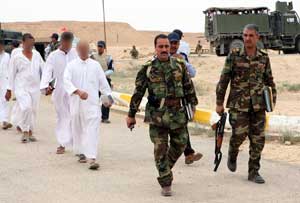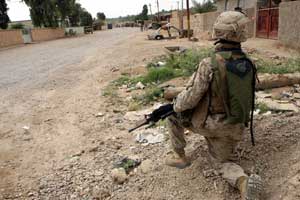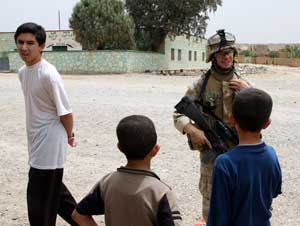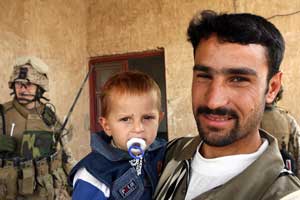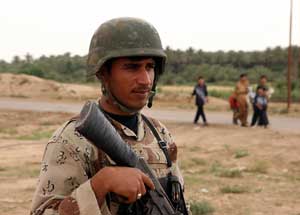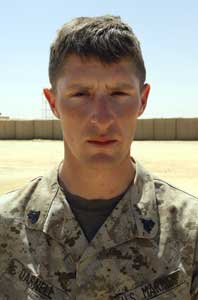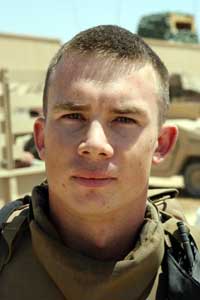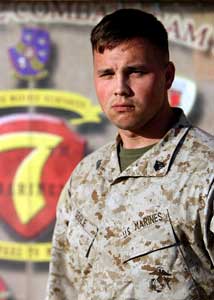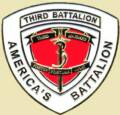
Note: This is not an official website. It's purpose is to support Marines of 3/3.
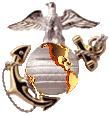
Marines fight heat, insurgents and roadway explosives in Iraq
Submitted by: Regimental Combat Team7 (USMC News)
Story by: Sgt. Roe F. Seigle
BAGHDADI, Iraq(May 21, 2006) -- Sgt. Andy Darnell watches the screen of a computer inside his heavily armored Humvee, tracking another convoy of Marines enroute to the U.S. military base here to replace his patrol.
As he tracks the patrol, he swats a sheet of small gnats from his face, which seem to multiply with the heat in this city of about 30,000 nestled along the Euphrates River northwest of Baghdad.
He looks at a picture of his wife, Heather, taped in the corner of the windshield of his Humvee, when a deafening explosion breaks the silence.
“We all knew what it was as soon as we heard it go off,” said Darnell, who was still sweating after completing an hour-long patrol in the Baghdadi streets. “The Marines knew as well and they all put on their game faces.”
Less than a mile away, the explosion is that of an improvised explosive device, the biggest threat that Darnell, a team leader with Weapons Co., from the Hawaii-based 3rd Battalion, 3rd Marine Regiment, faces on a daily basis in volatile Al Anbar Province.
This particular IED struck the convoy of Marines in the oncoming convoy while they were en route to relieve Darnell and his Marines from the makeshift patrol base.
Immediately following the blast, it’s unapparent to Darnell, 25, and his Marines if anyone was injured or killed by the roadside bomb, until another radio transmission quells their fear.
After several moments of radio silence, word of the IED’s impact reaches Darnell: no one was hurt. But not every convoy which strikes these roadside bombs are so lucky.
“You never know when an IED is going to strike,” said Darnell. “Marines are trained to keep their eyes open to anything suspicious and to wear every bit of protective gear they are issued.”
The Marines who were hit by the IED were protected by the Humvee’s layers of armor.
Minus a flat tire, the vehicle was undamaged.
On patrol the following day, it’s Darnell’s Humvee that’s hit with an IED. His team was returning to a forward operating base in another sector of Baghdadi, named Camp Lueken after Cpl. Eric R. Lueken, one of the battalion’s Marines who was killed by an IED April 22, 2006.
Darnell’s attitude is the same as the rest of the battalion’s Marines who have been exposed to these roadside killers – find those responsible and bring them to justice.
“These cowards out here know they would not beat us in a face-to-face fight, so they emplace these IEDs and then they go and hide,” said Darnell.
Cpl. Phillip Shockley, 22, a gunner, was manning the Humvee’s machine gun when the IED exploded. Although part of his body was outside of the interior of the humvee, he credits the armor shield around the turret for preventing any serious bodily injury.
“I would have been hit in the torso and the face,” said Shockley, a native of Salisbury, Md. “I actually feel safer now that I have seen first-hand how well the vehicle armor can protect us from shrapnel.”
Darnell, a native of Marietta, Ga., and the rest of the Weapons Co. Marines and their Iraqi counterparts in the 2nd Battalion, 2nd Brigade, 7th Iraqi Army Division – the Iraqi Army unit partnered with 3/3 - have their hands full patrolling the streets of Baghdadi.
The Marines and Iraqi soldiers must maintain a continuous presence to ensure the people’s safety.
Two weeks ago a handful of insurgents drove by the police station in Baghdadi and killed 15 police recruits with small arms fire, said Darnell.
More recently, several Marines and Iraqi soldiers have been exposed to IED blasts and a handful of them engaged in small arms firefights with insurgents.
Daily patrols through this dangerous region in the Euphrates Valley is the norm for these Hawaii-based Marines. They spend their days patrolling with “jundi,” the Iraqi military term for junior enlisted soldiers, in the rugged streets of Baghdadi looking for insurgent activity. The Iraqis and Marines also gather information to identify and locate insurgents, like those who place IEDs and murder innocent people, said Darnell.
“They are cowards,” said Cpl. Mark English, 22, who engaged in a firefight with insurgents May 9 while guarding a water treatment facility. “They know they do not stand a chance when fighting us face-to-face.”
English, a team leader with the battalion’s Lima Co., and two other Marines came under fire when insurgents opened fire from, according to English, about two football fields away and none of the rounds came within 50 meters of the Marines’ location in the confines of the water treatment facility. English, and the Marines under his charge, had set up an observation post there to observe any insurgent activity.
“It was pathetic,” said English, a native of Topeka, Kan. “At first, I did not even think they were firing at us.”
English said the Marines suppressed the insurgents “with superior firepower” until aerial support arrived and it was determined the insurgents had fled the area.
But the Marines and Iraqi soldiers are not the only ones providing security here. The city has its own police force, spearheaded by what the Marines call “a brave man” and a “one-man army” who has apprehended more than 130 insurgents since 2004.
Baghdadi Police Chief Col. Shabban B. Al Ubaydi has made it clear to insurgents that he is not afraid of them or the threats they make against him, his family, and Baghdadi’s residents.
Now, Ubaydi, and the Baghdadi police force he commands, work daily with the Marines here to quell the insurgency in the city. During joint operations, the Marines have trained the local police on how to patrol their streets and be approachable but still authoritative to locals.
Gunnery Sgt. Charles Huff, the intelligence advisor assigned to the Police Transition Team here says the Baghdadi Police are making progress towards independently patrolling Baghdadi with the Iraqi Army and gaining the trust of the local community. Many towns and cities in the Al Anbar Province still lack an organized, bonafide police force to clean up the neighborhoods.
Huff cites a recent incident when a schoolgirl fell down in the playground at her school and cut her chin. Iraqi police took the girl to one of the battalion’s U.S. Navy hospital corpsman, who cleaned and bandaged the wound. Acts like these, Huff says, will make the populace realize the police are no longer operating like a militia as they did under Saddam Hussein’s regime, but as protectors in their community.
“The people are starting to see more policemen in uniform and in police cars,” said Huff. “They are realizing they are not the bad guys like they were three years ago and they are starting to view them as protectors of the community.”
Still, Huff says the mission of making the Baghdadi Police independent is still in its infancy stages. Although the policemen have weapons, such as assault rifles, pistols, protective equipment and uniforms, they still have much to learn, said Huff. The police here are still learning how to keep their police force’s staff organized, to include administrative procedures and keeping supplies recorded.
“It is going to take a while to rebuild the communities and model a structured police force here in Baghdadi,” said Huff. “This is where the Police Transitioning Team comes in.”
The Police Transition Team, according to Huff, is composed of U.S. Marine reservists who were activated to serve in Iraq. Many of them have law enforcement experience. These Marines are spending countless hours teaching the policemen how to serve and protect their community – a work in progress.
Recently, Marines assigned to the transition team had their loved ones at home in the U.S. purchase soccer balls to be handed out to the children of Baghdadi, said Huff. The soccer balls were then distributed by the soldiers in Baghdadi to the children.
Soccer balls aside, Ubaydi, the Marines and Iraqi soldiers are getting the word out in Baghdadi that acts of insurgency are not going to be tolerated.
When several men were released from Abu Ghurayb prison May 10, 2006, Ubaydi warned them to be on their best behavior in this neighborhood of several thousand. Several of the prisoners, who were detained for such offenses as possessing illegal weapons and distributing anti-Coalition Forces propaganda, were turned over to Ubaydi to be released here.
“If you commit another crime against Coalition Forces, I will track you down and you will spend the rest of your life in prison away from your families,” warned Ubaydi to the prisoners before they were released. “You are going to be given a fresh start and a chance to lead a peaceful life.”
Before their release, the prisoners were fingerprinted and had their retinas scanned so Ubaydi’s police can easily identify the men in case they commit future offenses.
Though the job is dangerous, the Marines often reflect on their lives back home to get them through the deployment.
“I love my wife,” said Darnell, who has been separated from his family for more than two months now. “Knowing I will be reunited with the most wonderful person in the world keeps me motivated and focused out here. I will be with her soon enough.”
By the end of their deployment the Weapons Co. Marines say they are confident that the local police will be fully capable of policing the streets on their own.
Col. Shabban B. Al Ubaydi, chief of police for Baghdadi, Iraq – a small town nestled along the Euphrates River in Iraq’s western Al Anbar Province – leads a group of detainees into town, where they were released into the community. The detainees, all released recently from Abu Ghraib prison, were warned by Ubaydi before their release to be on their best behavior, or he would deal with them accordingly. Ubaydi works with Marines from the Hawaii-based 3rd Battalion, 3rd Marine Regiment and Iraqi soldiers to keep insurgents out of Baghdadi. The Marines call Ubaydi “a brave man” and a “one-man army.” The police chief, who lost his brother to terrorism several months ago, has apprehended more than 130 insurgents since 2004. Photo by: Sgt. Roe F. Seigle
A Marine from the Hawaii-based Weapons Company, 3rd Battalion, 3rd Marine Regiment watches an alleyway during a patrol of Baghdadi, Iraq May 14, 2006. Marines patrol the streets daily with Iraqi soldiers and work closely with local police to provide security to Baghdadi, a town of 30,000 people nestled along the Euphrates River. The Marines arrived in Iraq about two months ago, and have since dealt with improvised explosive devices, insurgent attacks, and hot weather. The battalion arrived in Iraq about two months ago. Photo by: Sgt. Roe F. Seigle
A Marine with the Hawaii-based 3rd Battalion, 3rd Marine Regiment shares a laugh with Iraqi children in Baghdadi, Iraq, during a joint patrol between the Marines and Iraqi soldiers May 14, 2006. Marines patrol the streets daily with Iraqi soldiers and work closely with local police to provide security to Baghdadi, a town of 30,000 people nestled along the Euphrates River. The Marines arrived in Iraq about two months ago, and have since dealt with improvised explosive devices, insurgent attacks, and hot weather. Photo by: Sgt. Roe F. Seigle
A local man pauses to pose for a camera with his baby while Marines patrol near his home in Baghdadi, Iraq, May 14, 2006. The man offered Marines, all from the Hawaii-based Weapons Company, 3rd Battalion, 3rd Marine Regiment, into his home for hot tea. Although the Marines politely declined the offer, the man still wanted to talk to Marines and thank them for protecting his community. Marines patrol the streets daily with Iraqi soldiers and work closely with local police to provide security to Baghdadi, a town of 30,000 people nestled along the Euphrates River. The Marines arrived in Iraq about two months ago, and have since dealt with improvised explosive devices, insurgent attacks, and hot weather. Photo by: Sgt. Roe F. Seigle
An Iraqi soldier assigned to the 2nd Battalion, 2nd Brigade, 7th Iraqi Army Division keeps an alert eye for any suspicious activity while on a joint patrol with Marines from the Hawaii-based Weapons Company, 3rd Battalion, 3rd Marine Regiment, May 14, 2006 in Baghdadi, Iraq. Marines patrol the streets daily with Iraqi soldiers and work closely with local police to provide security to Baghdadi, a town of 30,000 people nestled along the Euphrates River. The Marines arrived in Iraq about two months ago, and have since dealt with improvised explosive devices, insurgent attacks, and hot weather. Photo by: Sgt. Roe F. Seigle
Sgt. Andy Darnell, a 25-year-old U.S. Marine infantry team leader, spends his days patrolling for insurgent activity and providing security for Iraqis near and around Baghdadi, Iraq – a town of about 30,000 people nestled along the Euphrates River in the western Al Anbar Province. Darnell, from Marietta, Ga., is assigned to Weapons Company from the Hawaii-based 3rd Battalion, 3rd Marine Regiment, which deployed in support of Operation Iraqi Freedom two months ago. Darnell leads a team of Marines through Al Anbar’s dangerous roads nearly daily, where roadside bombs – improvised explosive devices – are the number-one threat. Photo by: Sgt. Roe F. Seigle
Daily patrols through this dangerous region in the Euphrates Valley is the norm for the Hawaii-based Marines of 3rd Battalion, 3rd Marine Regiment. They spend their days patrolling with “jundi,” the Iraqi military term for junior enlisted soldiers, in the rugged streets of Baghdadi looking for insurgent activity. The Iraqis and Marines also gather information to identify and locate insurgents, like those who place IEDs Cpl. Mark English, a 22-year-old from Topeka, Kan., is a team leader for the battalion’s Lima Company and leads Marines daily in the search for insurgents. “They are cowards,” said English, who engaged in a firefight with insurgents May 9 while guarding a water treatment facility. “They know they do not stand a chance when fighting us face-to-face.” Photo by: Sgt. Roe F. Seigle
Sgt. Roe F. Seigle, author of this article, is a 26-year-old Marine Corps combat correspondent from Marietta, Ga. Seigle, who graduated from Marietta High School in 2001, is currently deployed in support of Operation Iraqi Freedom with the Hawaii-based 3rd Battalion, 3rd Marine Regiment, which is currently attached to Regimental Combat Team 7, 1st Marine Division in Iraq’s western Al Anbar Province. As a combat correspondent, Seigle’s duties include writing news articles, taking photographs and recording video – all for publication on Marine Corps News at www.usmc.mil – of his unit’s activities while in support of Operation Iraqi Freedom. The five-year Marine veteran has been deployed for two months now, and says the most challenging part of his job is writing about Marines who gave their life fighting. Seigle plan on returning to Marietta in October – after his return to the U.S.— where he’ll visit his family and two high school teachers he credits for helping him become who he is today. “I plan on visiting Mrs. Barbara Benfield and Mr. Michael Shallow, two teachers at Marietta High School who believe in me when no other teachers seemed to,” said Seigle, whose father and godfather are both police officers in Marietta. While Seigle still has four-plus months before he can return home to Marietta, he has a special message for others in his hometown: “I want to tell all those in Marietta that the freedom and safety they enjoy is being paid for by my fellow Marines and service members who have passed away. To the family of Marietta native and Army Pfc. Jesus Fonseca Jr., your son, a brave warrior, will never be forgotten and his sacrifices will always be remembered. Jesus and Maria, the parents of this young warrior that gave his life, God bless you. I keep you in my prayers even though we have never met.” Photo by: Staff Sgt. Jim Goodwin
